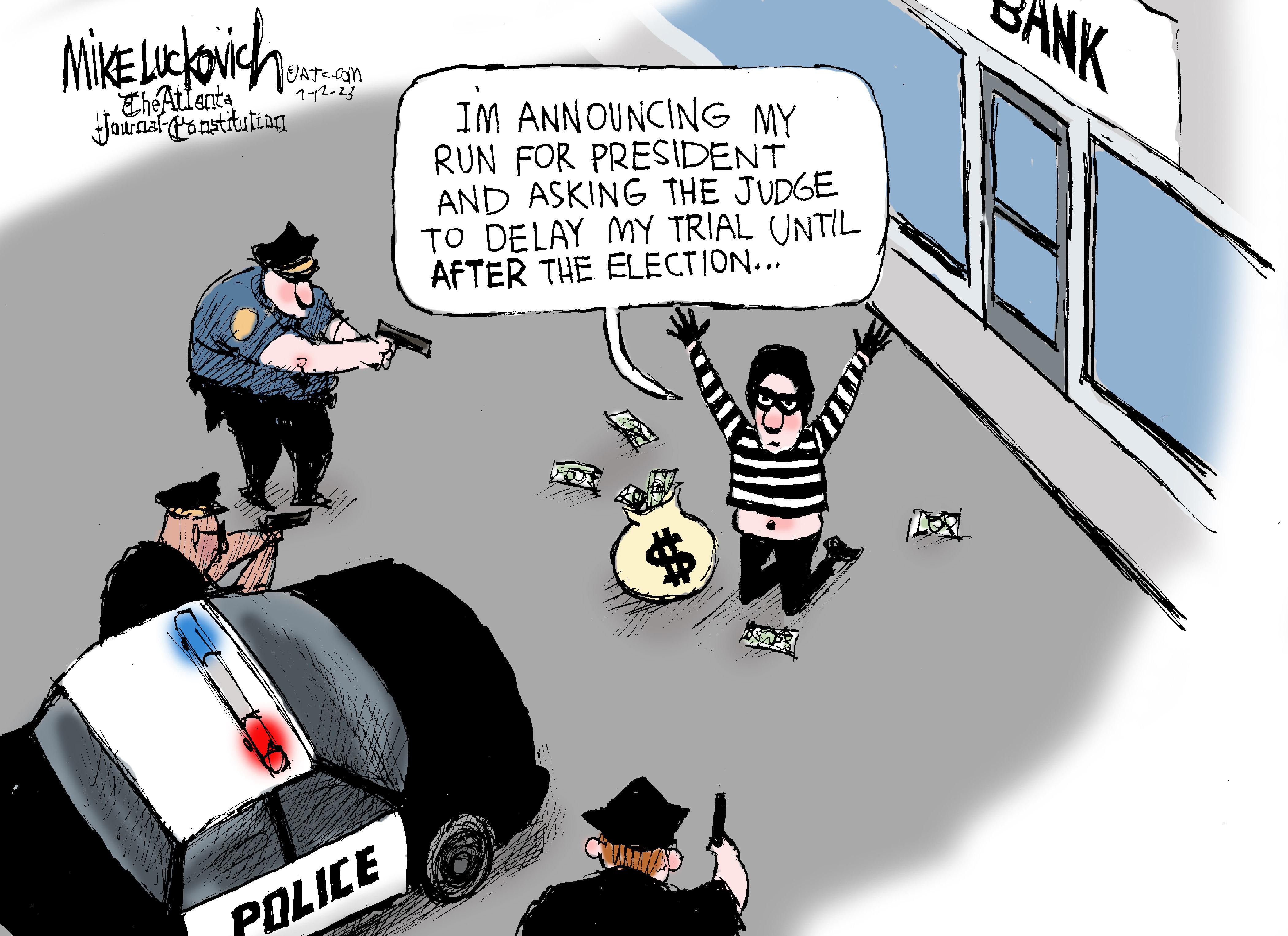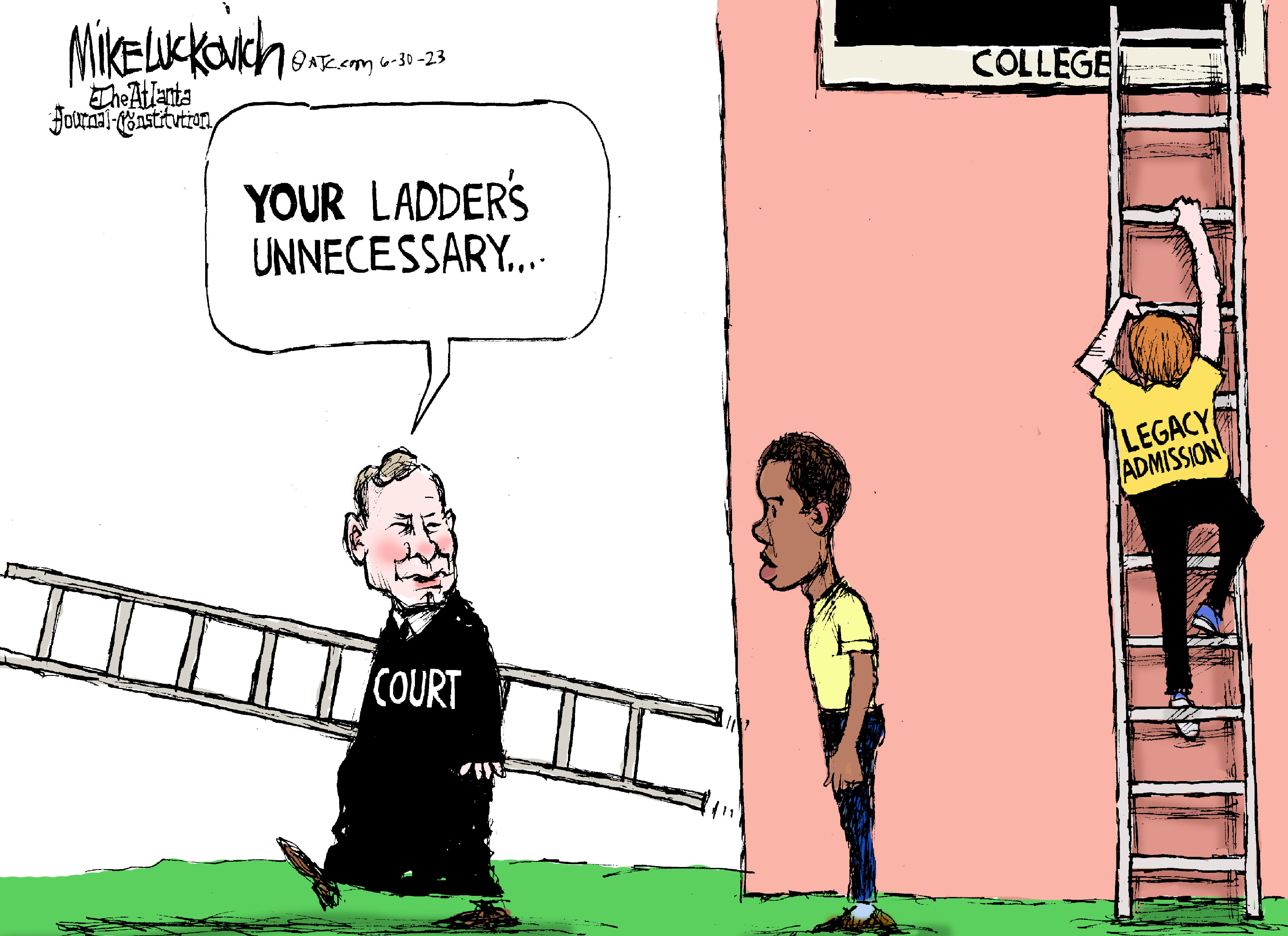No Sift next week. New articles will start appearing again on August 7.
"Stop saying I'm violent or I'll send people to murder your family" is an unpersuasive argument.
- Amanda Marcotte
"Trump threats will only backfire on him — they prove Jack Smith's entire case"
This week's featured posts are "The Party of False Equivalence" and "The DeSantis-approved version of American racial history".
This week everybody was talking about a January 6 Trump indictment

Tuesday, Donald Trump announced that he had received a target letter from Jack Smith, warning of a possible indictment by the DC grand jury investigating January 6 and the overall plot to reverse Trump's 2020 defeat at the polls. The letter gave him the opportunity to tell his side of the story last week, which he decided not to do. (Trump doesn't actually have a side of the story. His defense relies on delay, getting evidence thrown out, accusing the prosecutors of political bias, and intimidating the legal system with thinly veiled threats of violence.)
If the timing follows the pattern of the Mar-a-Lago case, an indictment should appear this week.
Much discussion ensued about what that indictment might contain, based on the target letter (that was never officially released). I repeat earlier caveats: Indulge in this speculation if you find it engaging, but don't imagine that you're making a wise use of your time. We'll all see the same indictment soon enough.
In a related development, Michigan Attorney General Dana Nessel charged the state's 16 fake Trump electors with a number of crimes, including forgery.
Jack Smith is also looking into the fake electors in seven states, but Michigan's action suggests a sensible division of labor: The states should charge the electors themselves, and federal prosecutors should go after the Trump campaign officials who organized and promoted the plot across multiple states.
After all, trying to steal a state's electoral votes is fundamentally an offense against that state. Also, the fake electors proceeded somewhat differently in different states, so they shouldn't all face the same consequences. The Michigan electors created and signed a fraudulent certificate naming themselves as "the duly elected and qualified for President and Vice President of the United States from the State of Michigan" and casting Michigan's 16 electoral votes for Donald Trump, who lost Michigan by over 150,000 votes.
New Mexico's fake electors, by contrast, signed a certificate "on the understanding that it might later be determined that we are the duly elected and qualified Electors" -- a statement that seems considerably less fraudulent.

Speaking of the Mar-a-Lago case, Judge Cannon set a trial date: May 20.
As we awaited Judge Aileen Cannon's announcement of a trial schedule for the Mar-a-Lago documents case, the big question was: How biased towards Trump is Cannon going to be? Her previous rulings on the items seized in the Mar-a-Lago search were absurdly pro-Trump, so divorced from law and logic that they earned her a stern rebuke from a three-judge panel at the next level, in spite of two of them being Trump appointees.
Jack Smith's people had asked for the trial to start in December, a schedule widely recognized as ambitious but not unreasonable. Trump's lawyers asked the judge not to set a trial date at all, which would violate the law. And they argued that Trump should not be tried until after the election, when he might again be protected by a DoJ policy of not indicting a sitting president, and he could be in a position to fire Smith himself.
Giving Trump what he wanted would be asking for another slap from the appeals court, so May 20 looks like the longest delay she thought she could get away with. Most presidential primaries will be over, and Trump may well have the Republican nomination locked up. From there the date could slip further, so Trump may yet get his wish not to be tried until after the election.
But that may not be as good for Trump as he imagines. If the trial still hasn't happened when voting starts, the election becomes a referendum on his guilt. "Vote to keep me out of jail" is not a compelling campaign slogan.
and culture wars
I'm always torn about how much play to give culture-war skirmishes. On the one hand, people saying ridiculous or obnoxious things should be called out. They're telling us who they are, and we should take that seriously. But on the other, a lot of them are intentionally trolling so that they can ride a wave of backlash when liberals like me criticize them. And finally, culture-war issues are often shiny objects that are supposed to distract us from real problems like climate change and racism.
Even so, sometimes I just can't ignore them.
Exhibit #1 this week was Jason Aldean's country-music song and video "Try That in a Small Town", which was all over my social media news feed.
Now, I grew up in a relatively small town. (Quincy, Illinois has about 40K people, making it about 1/5 the size of Macon, Georgia, where Aldean grew up.) I don't live there any more (and Aldean doesn't live in Macon), but I still go back regularly, a decade after my parents died. So I see the charm of small-town life, recognize the importance of respecting your roots, and understand the sting of big-city people dismissing "fly-over country" as "the middle of nowhere".
That sting is why small-town and rural people occasionally need to cut loose with a shout of pride in who they are and where they come from, in anthems like John Mellencamp's "Small Town", John Denver's "Thank God I'm a Country Boy", and others even older. Those songs are full of positive emotions like affection, contentment, and gratitude. Fundamentally, they are what therapists refer to as I-statements: "This is what life is like for me. You may not want to live this way, but I love it."
Aldean's song, by contrast, is addressed to "you", the kind of urbanite he has violent fantasies about. He's daring you to "cross that line", because small towns are "Full of good ol' boys, raised up right", so "If you're looking for a fight, try that in a small town".
He underscores the point by centering the video on a Tennessee courthouse that was the site of a famous lynching. And I was particularly amused by one behavior he recommends you leave in the city: "pull a gun on the owner of a liquor store" -- like that never happened where I grew up. (In the real world, robbing a liquor store is the quintessential redneck crime. Grab me a six-pack on your way out the door.)
Several people on social media mentioned Ahmaud Arbery, a Black man who tried jogging in a small town, and was murdered by gun-toting racists. Sadly, his killers can't go to an Aldean concert because they're in prison now. Whenever this song comes up on the radio, though, I'm sure they sing along.

But you know who really ought to be upset? People who live in small towns, but somehow aren't filled with hate and possessed by violent fantasies. (I know lots of them.) Aldean has very effectively validated all the stereotypes the rest of the country holds against them. Thanks, Jason.
And then there's the over-the-top conservative outrage against the Barbie movie, which I haven't seen. OK, I just wrote about a conservative music video, but at least I didn't post a 45-minute rant and then set fire to a doll like Ben Shapiro did.
One theme of Barbie for decades has been that girls can do anything (and look fabulous). So I can't figure why anybody would be surprised that a Barbie movie is "woke". (I'm reminded of the people who keep asking "When did Star Trek get so woke?" Star Trek was always woke.)
I also shake my head at the people who are outraged that one of the Barbies is played by a trans woman. Seriously: You think that kids who were called "boys" but believed they were girls didn't didn't play with Barbies? That piece of the fan base must go back to the beginning.
and you also might be interested in ...
Today, Netanyahu's coalition in the Knesset passed his bill to limit the power of the nation's supreme court. The bill had been the target of massive protests for months, with critics claiming that Israel would no longer be a democracy if it passed. I guess we'll find out how accurate that assessment was.
One of the few good decisions the Supreme Court made this year was to uphold a lower-court injunction against Alabama's congressional-district map. The map's problem was that only 1 of the 7 districts were majority-Black, when Blacks make up 1/4th of the state's population. The Court ruled that this was very likely a violation of the Voting Rights Act, and so could not be used for the 2024 congressional elections.
Everyone assumed the Alabama legislature would go back to the drawing board and come up with a map that had two majority-Black districts. But apparently not: The two houses of the legislature have each proposed new maps that again have only one majority-Black district. They need to finalize their decision by Friday.
Ian Milhiser makes a tongue-in-cheek reference to the days before John Roberts gutted VRA enforcement:
One novel idea that someone should try is that we could make states with a history of enacting racist voting laws, often in defiance of federal court orders, to “pre clear” their election laws with officials in Washington, DC.
Russia has pulled out of the Black Sea Grain Initiative, which had allowed Ukraine to export food. Prewar Ukraine was the source of 10% of the world's wheat exports and half of its sunflower oil. Instead, Russia has begun bombing infrastructure in Odesa, Ukraine's main grain-shipping port. Food prices around the world are expected to rise.
Anti-abortion activists often deny that they want to criminalize women, but that's what's happening. In Nebraska, a teen-aged woman was sentenced to 90 days in jail and two years probation. Her crime: She took miscarriage-inducing pills past the 20-week mark of her pregnancy, miscarried, and then disposed of the dead fetus' body without notifying authorities. She was 17 at the time. The sentence follows her guilty plea for "concealing or abandoning a dead body", a felony. Her mother, who acquired the pills, is awaiting sentencing.
When voters in the UK voted "Leave" in the 2016 Brexit referendum, many people foresaw a trend in which political ties of all sorts would begin to dissolve. But instead, the struggles of the post-Brexit UK have become a cautionary tale.
The NYT reports on a study that quantifies the carbon footprint of eating meat, especially beef. The subheadline says:
Researchers examined the diets of 55,500 people and found that vegans are responsible for 75 percent fewer greenhouse gases than meat-eaters.
Actually, I don't like that way of framing the result, because it emphasizes the extremes. Even if you aren't willing to go all the way to a vegan diet, cutting down the amount of meat you eat or shifting from beef to poultry and fish could still make a large difference. The body of the article is clear about that, but the headline lends itself to an all-or-nothing view.
and let's close with something derivative
I love music video parodies and I love countdowns, so of course I love watchmojo.com's countdown of their 20 favorite music-video parodies.










